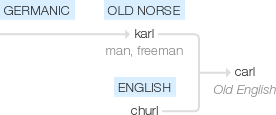Carl
Old English (denoting a peasant or villein): from Old Norse karl ‘man, freeman’, of Germanic origin; related to churl.
wiktionary
From Middle English carl, from Old English carl, a borrowing from Old Norse karl(“man, husband”), from Proto-Germanic *karilaz. Doublet of churl.
Origin uncertain.
etymonline
carl (n.)
c. 1300, "bondsman; common man, man of low birth," from Old Norse karl "man (as opposed to "woman"), male, freeman," from Proto-Germanic *karlon- (source also of Dutch karel "a fellow," Old High German karl "a man, husband), the same base that produced Old English ceorl "man of low degree" (see churl) and the masc. proper name Carl.
The Mellere was a stout carle for the nones [Chaucer]
Carl
masc. proper name, from continental sources such as Danish Carl, Middle High German Karl, from the common noun meaning "man, husband" (see carl). The Carlists in 19c. Spain were partisans of Don Carlos de Borbon.
